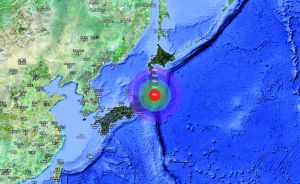For several weeks, scientists of Karlsruhe Institute of Technology (KIT) have analyzed the impacts of the natural disasters in Japan on the nuclear power plants at Fukushima in working groups of the Helmholtz Association under the direction of KIT. Urgent questions are answered on the KIT websites. An event on June 09, 19 hrs, at the Gerthsen-Hörsaal on Campus South will offer another type of approach to the disaster that marked a major turning point for many of us.
“Ohnmacht und dennoch … (Helplessness and still…)”: With a combination of scientific presentations by KIT experts, reports of students, poetry, and music, the event initiated and organized by the Studies Center for Visually Impaired Students under the auspices of the KIT Presidential Committee will focus on the tsunami and the following reactor accident. After the welcome by the Head of the Studies Center for Visually Impaired Students, Joachim Klaus, and a welcome address by KIT Vice President Dr. Peter Fritz, the program will continue with two reports by students who passed a traineeship at an industrial company in the Japanese capital when the catastrophes happened.
Dr. Joachim Knebel, expert for reactor safety and Chief Science Officer at KIT, and Dr. Ellen Gottschämmer from the Geophysical Institute will then report about the current situation and about research into natural disasters.
The musical and poetic parts will then lie in the hands of Gerhard Jaworek and pianist Martin Engel. Jaworek, member of the staff of the Studies Center for Visually Impaired Students, will deal with the catastrophe in a musical and literary way under the heading of “Die Welt ist nicht mehr wie sie war” (World no longer is as it was before). Engel, student of the master class of Professor Kalle Randalu at the Karlsruhe University of Music, will play romantic pieces by Franz Liszt and Robert Schumann.
The Studies Center for Visually Impaired Students (SZS) founded in 1993 initiated this event due to their long and close relations to Japanese scientists and students, universities, and research institutions. Japanese scientists frequently stay at SZS, Japanese students regularly participate in the annual International Camp on Communication & Computers for visually impaired and blind adolescents, and diploma theses of SZS students are supervised by Japanese university teachers.
The program of the event is available at http://www.szs.uni-karlsruhe.de/download/flyer_japan.pdf.
In close partnership with society, KIT develops solutions for urgent challenges – from climate change, energy transition and sustainable use of natural resources to artificial intelligence, sovereignty and an aging population. As The University in the Helmholtz Association, KIT unites scientific excellence from insight to application-driven research under one roof – and is thus in a unique position to drive this transformation. As a University of Excellence, KIT offers its more than 10,000 employees and 22,800 students outstanding opportunities to shape a sustainable and resilient future. KIT – Science for Impact.

